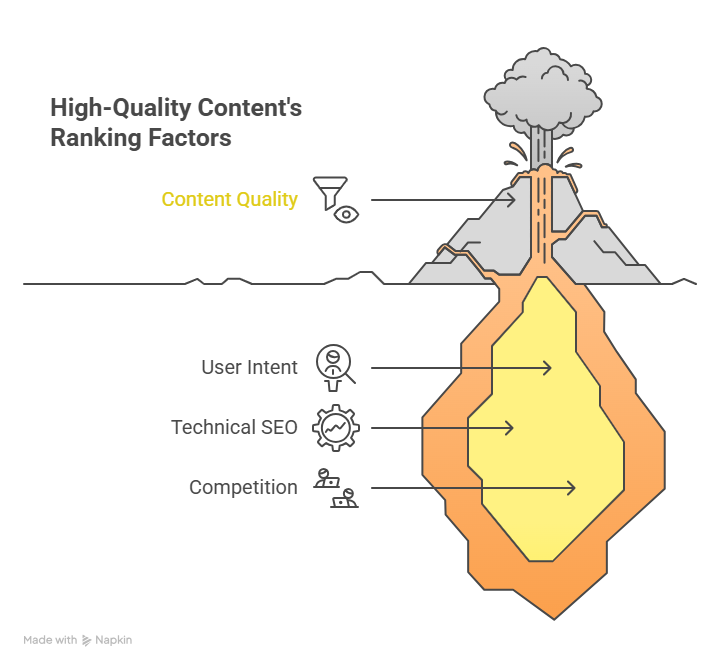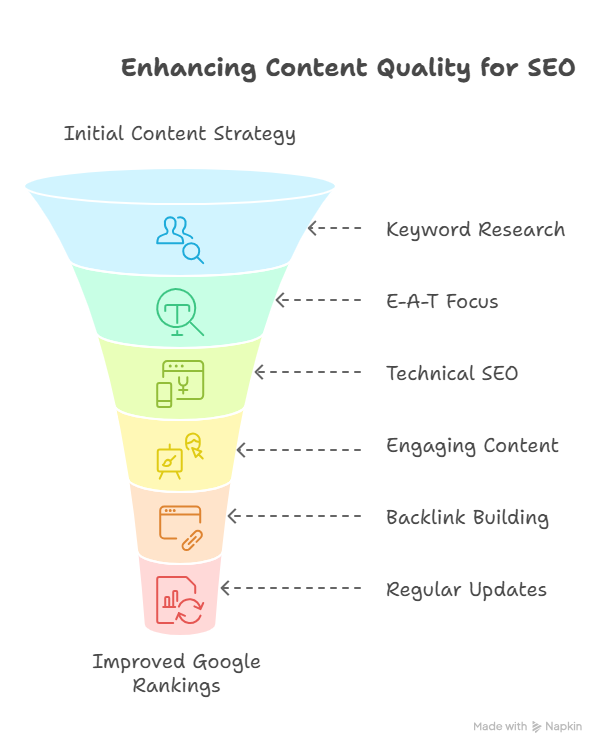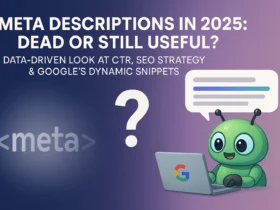Introduction: Decoding Content Quality SEO
In the world of content quality SEO, many marketers assume that crafting high-quality content guarantees top Google search rankings. However, creating valuable content doesn’t always translate to SEO success. Factors beyond quality, such as technical SEO and user intent, often influence rankings. This article dives into why Google may not always reward the best content and offers practical tips for a robust SEO content strategy. For expert guidance, visit Webie’s SEO services to elevate your content game.
Why High-Quality Content Isn’t Enough
High-quality content is the cornerstone of any SEO content strategy, but it’s not a golden ticket to Google’s top spots. Google’s algorithms prioritize a mix of factors, and quality alone doesn’t always cut it. Understanding these dynamics is key to mastering content quality SEO.
1. User Intent Matters More
Google aims to match search results with user intent. Even the most well-crafted content may rank poorly if it doesn’t align with what users are searching for. For example, a detailed guide might lose out to a concise FAQ page if users seek quick answers.
2. Technical SEO Plays a Role
A beautifully written article can be overlooked if your website has technical issues. Slow loading times, poor mobile optimization, or broken links can hurt Google search rankings, regardless of content quality.
3. Competition and Authority
Established websites with strong domain authority often outrank newer sites, even if their content is less detailed. Building authority through backlinks and consistent content is crucial for creating valuable content that ranks.
For more on strategic content planning, check out our podcast on holiday marketing campaigns.

What Google Prioritizes in Rankings
To succeed in content quality SEO, you need to understand Google’s ranking factors. While high-quality content is essential, other elements play a significant role in Google search rankings.
- Relevance: Content must closely match the user’s query. Keyword research helps ensure your content aligns with search intent.
- User Experience: Fast-loading pages, intuitive navigation, and mobile-friendliness enhance user satisfaction, boosting rankings.
- Engagement Metrics: Google tracks metrics like bounce rate and time on page to gauge content value. Engaging content keeps users on your site longer.
- Backlinks: Quality backlinks signal authority, making your content more likely to rank.
By balancing these factors with an SEO content strategy, you can improve your chances of creating valuable content that Google rewards.
How to Optimize for Content Quality SEO
While Google may not always prioritize the best content, you can still improve your Google search rankings with a smart SEO content strategy. Here are actionable steps to enhance your content quality SEO:
- Conduct Thorough Keyword Research: Identify keywords that align with user intent. Tools like Ahrefs or SEMrush can help you find terms relevant to your audience.
- Focus on E-A-T (Expertise, Authoritativeness, Trustworthiness): Showcase your expertise through well-researched content, credible sources, and author bios to build trust.
- Optimize for Technical SEO: Ensure your site is fast, mobile-friendly, and free of technical errors. Use tools like Google PageSpeed Insights to identify issues.
- Create Engaging Content: Use visuals, clear headings, and concise paragraphs to keep readers hooked. Engaging content reduces bounce rates and signals quality to Google.
- Build Quality Backlinks: Reach out to reputable sites for guest posts or collaborations to boost your site’s authority.
- Update Content Regularly: Refresh older posts with new data or insights to maintain relevance and improve rankings.
For professional support in crafting an SEO content strategy, explore Webie’s services.

Common Misconceptions About Google Rankings
Several myths surround content quality SEO and Google search rankings. Let’s clear them up:
- Myth 1: Longer Content Always Ranks Better: While in-depth content can perform well, brevity often wins if it better matches user intent.
- Myth 2: Keywords Are Everything: Overstuffing keywords harms readability and rankings. Focus on natural integration within high-quality content.
- Myth 3: Google Only Cares About Quality: Technical SEO, user experience, and authority are equally critical for creating valuable content.
By debunking these myths, you can refine your SEO content strategy for better results.
Challenges in Content Quality SEO
Achieving success in content quality SEO comes with hurdles. Here’s how to address them:
- Keeping Up with Algorithm Changes: Google frequently updates its algorithms. Solution: Stay informed through industry blogs and adapt your SEO content strategy.
- Balancing Quality and Quantity: Producing high-quality content consistently is time-intensive. Solution: Plan a content calendar to maintain a steady output.
- Competing with Established Sites: Newer sites struggle against high-authority competitors. Solution: Focus on niche topics and build backlinks to grow authority.
With persistence and the right approach, these challenges can be overcome, ensuring your content ranks higher.

The Future of SEO Content Strategy
As Google’s algorithms evolve, content quality SEO will increasingly emphasize user experience and intent. Voice search, AI-driven results, and personalized rankings are shaping the future. To stay ahead, prioritize creating valuable content that’s technically sound and user-focused.
For seasonal content inspiration, listen to our podcast on holiday marketing strategies.
Conclusion: Mastering Content Quality SEO
Content quality SEO is about more than just crafting high-quality content—it’s about aligning with Google’s priorities to achieve top Google search rankings. By understanding user intent, optimizing technical SEO, and building authority, you can create valuable content that stands out. While Google may not always reward the “best” content, a strategic SEO content strategy ensures your efforts pay off. Ready to boost your rankings? Visit Webie’s SEO services for expert solutions, and explore our podcast on seasonal marketing tactics for more insights.



























Leave a Reply